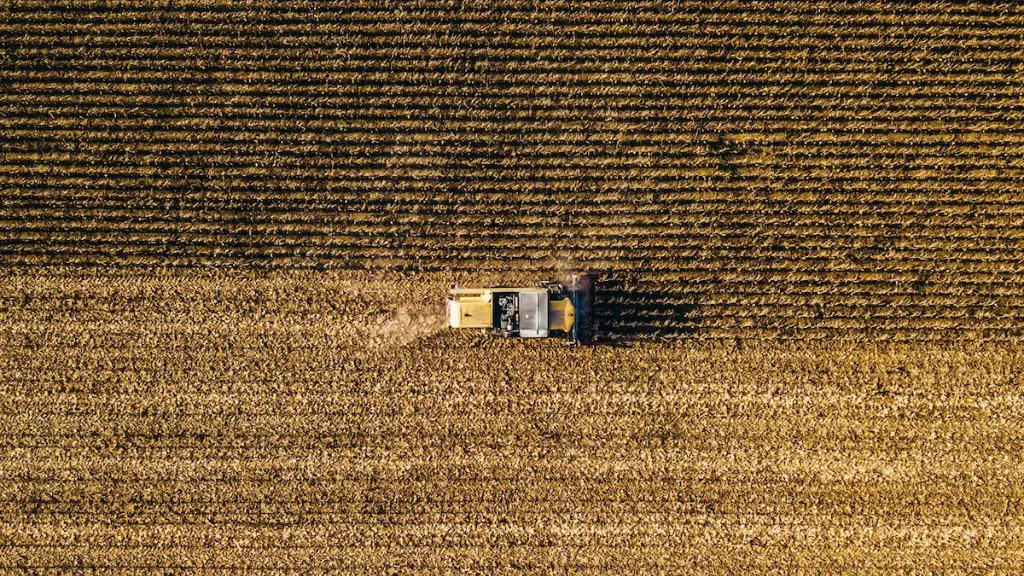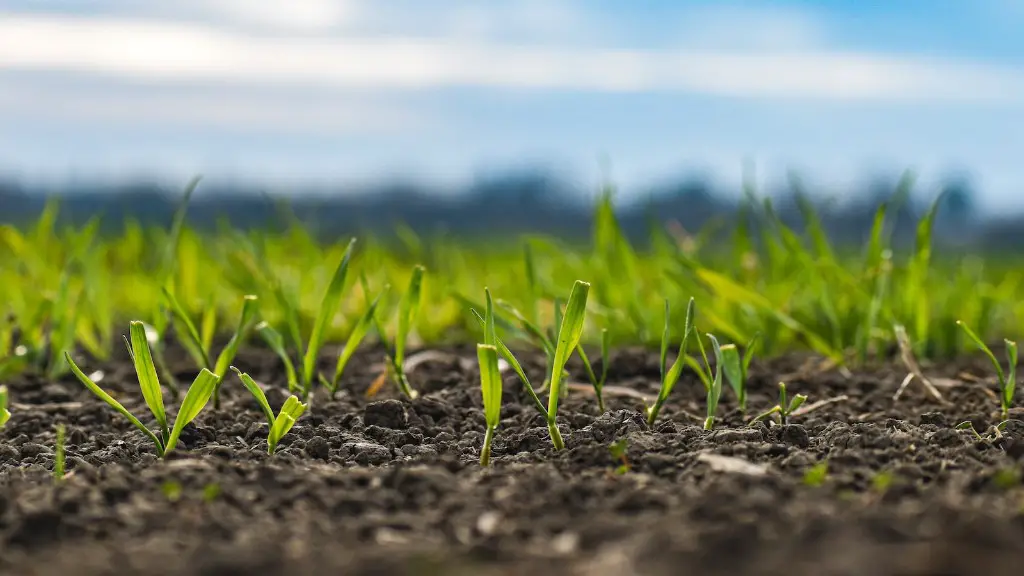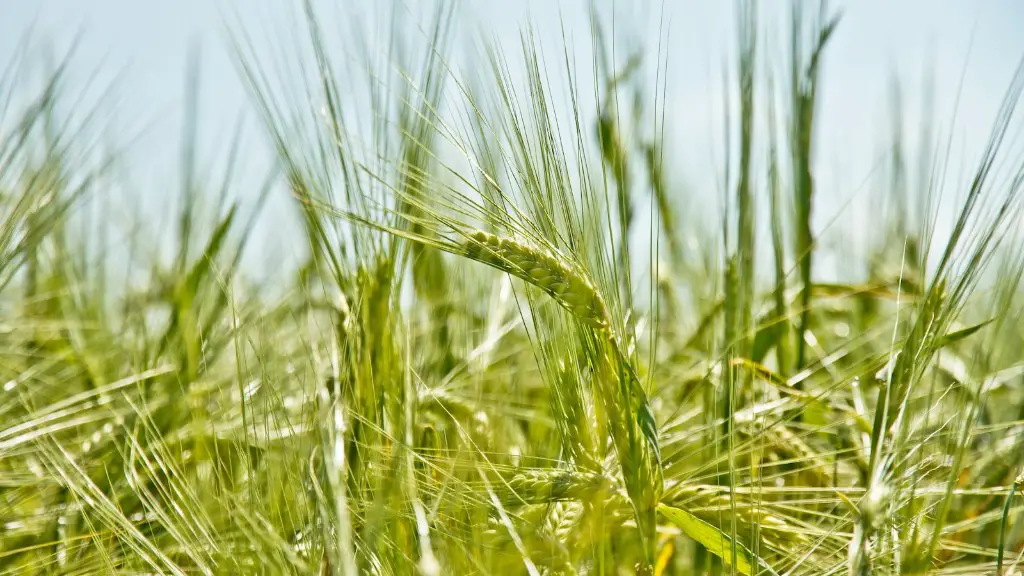Nitrogen fixation is an essential process in the development of sustainable agricultural practices. Nitrogen is a primary element in the core macronutrients that help plants to grow, and is essential to many biological processes. Nitrogen fixation is the process by which atmospheric nitrogen is converted into organic compounds that are usable by organisms and plants. This process helps to ensure that plants and crops receive the necessary nutrients in order to thrive. Without nitrogen fixation, a large number of plants and crops would not survive, as they would be unable to access the nitrogen-based macronutrients they need to thrive.
In the natural environment, nitrogen fixation occurs in a variety of different ways, ranging from certain species of bacteria to lightning strikes. However, in modern agricultural ecosystems nitrogen fixation must be assisted and supplemented, primarily through the use of nitrogen-fixing bacteria on plant roots, or through the application of nitrogen-rich fertilizers. Nitrogen fertilizer has a huge impact on crop production, and is also responsible for potential environmental damage, so nitrogen-fixing bacteria are increasingly being used to assist in the process.
Nitrogen-fixing bacteria, most commonly in the form of Rhizobium, are capable of creating a symbiotic relationship with plants, allowing them to access the nitrogen they need while reducing or eliminating the need for nitrogen fertilizers. Rhizobium bacteria live on plant roots, and utilize the plant’s intrinsic energy to convert atmospheric nitrogen into nitrogen that can be used by the plant. This is a much more energy-efficient and sustainable way of ensuring that plants have access to the nitrogen they need, while allowing farmers to reduce or eliminate the use of nitrogen-rich fertilizers.
Nitrogen-fixing bacteria are also capable of surviving in a variety of different soil conditions, even in those with low fertility, making them an ideal choice for farmers facing poor soil conditions or limited access to fertilizers. This means that nitrogen fixation can be used to increase productivity, even when other methods of nutrient supplementation would be ineffective. Additionally, the use of nitrogen-fixing bacteria helps to reduce and potentially eliminate the environmental damage that can occur from excess nitrogen fertilizers.
Nitrogen fixation is essential for the growth of healthy and productive crop systems, and is an increasingly important part of sustainable agricultural practices. By utilizing the symbiotic relationship between nitrogen-fixing bacteria and plants, farmers can reduce their reliance on nitrogen-rich fertilizers, while ensuring that their crops have access to the necessary nitrogen-based macronutrients. Additionally, such practices can help to reduce the potential environmental damage associated with traditional fertilizer applications. Nitrogen fixation is an essential part of sustainable agricultural practices and is necessary for the continued growth and productivity of crop systems.
How Does Nitrogen Fixation Work?
Nitrogen fixation is a process by which atmospheric nitrogen is converted into organic compounds that can be used by plants. This process, which is essential for sustainable agriculture, is primarily facilitated through the use of nitrogen-fixing bacteria. Such bacteria form a symbiotic relationship with the plants they inhabit, where the bacteria fix atmospheric nitrogen and convert it into forms that can be used by the plants. This process allows farmers to reduce their reliance on nitrogen-based fertilizers while providing their crops with the nitrogen they need to thrive.
What are the Benefits of Using Nitrogen Fixation?
The primary benefit of using nitrogen fixation is the reduced need for the application of nitrogen-rich fertilizers. By utilizing the symbiotic relationship between nitrogen-fixation bacteria and plants, farmers are able to reduce their dependence on fertilizer, while still ensuring their crops have access to the nitrogen necessary for growth. Additionally, the use of such methods can assist in reducing environmental damage associated with traditional fertilizer applications.
What are the Drawbacks of Using Nitrogen Fixation?
While there are many benefits associated with the use of nitrogen fixation, it does have some potential drawbacks. The primary drawback is that nitrogen fixation is a slow process, with bacteria often taking weeks to fix the necessary nitrogen for a single plant. Additionally, the symbiotic relationship between bacteria and plants is sometimes unstable, leading to nitrogen shortages and unpredictable growth patterns.
What Alternatives to Nitrogen Fixation Exist?
Many people opt for alternatives to nitrogen-fixation, such as the use of nitrogen-based fertilizers. While such methods can be effective, they do come with the potential for environmental damage, as the nitrogen can leach into the soil and groundwater. Additionally, nitrogen-rich fertilizers are not always sustainable or cost effective, making them an unsuitable option in some cases.
What Crops Benefit from Nitrogen Fixation?
Nitrogen-fixation is beneficial for a variety of different crop types, ranging from vegetables and grains to forage crops and perennials. Grains and vegetables typically require the most nitrogen, though forage crops can also benefit from nitrogen fixation, as these typically have higher nitrogen requirements. Additionally, perennials are also capable of benefitting from nitrogen-fixation, as these plants require nitrogen for longevity.
What Types of Bacteria are Used for Nitrogen Fixation?
The most common type of bacteria used for nitrogen-fixation is Rhizobium, which is a genus of nitrogen-fixing bacteria that can form a symbiotic relationship with plants. Rhizobium is one of the most common nitrogen-fixing bacteria and is capable of surviving in a variety of soil conditions and climates. Other bacteria that are used for nitrogen-fixation include Azotobacter, Azospirillum, Azomonas, and Clostridia.


